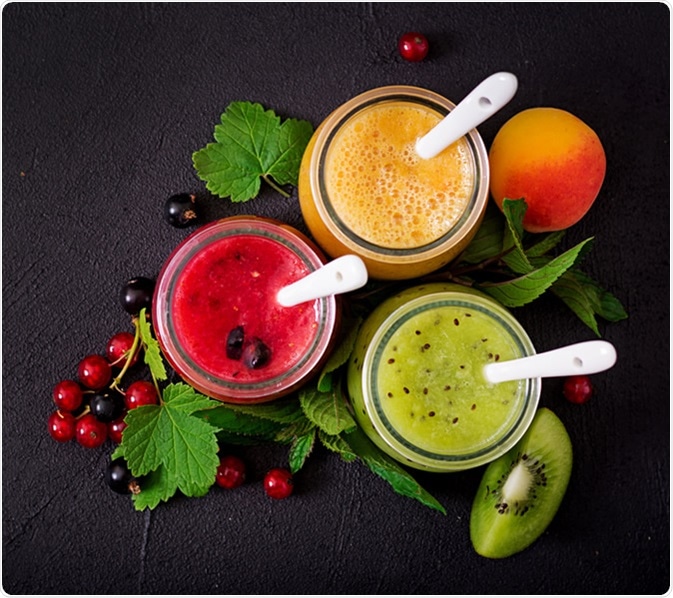Juicing is a popular trend these days and is touted for its weight loss and detoxing benefits. To keep up with the increasing demand, plenty of ready-to-drink juice options are available in stores. However, we have reasons to believe that although juicing does increase fruit intake, it may not be as healthy as it sounds and it may even be unhealthy in excess and in the long term.
How healthy is juicing?
Several reports suggests that consumption of 100% fruit juice help deliver essential nutrients, is a cost-effective way by which people can satisfy fruit intake recommendations, and allows access to a variety of fruits throughout the year. 100% juice can retain the nutritional value of whole fruit, with the exception of vitamin C and fiber, when appropriate production methods and storage conditions are applied. However, some reports say the fruit juice consumption leads to unhealthy outcomes, especially among children.

Image Credit: Timolina / Shutterstock
Juice makes us feel full quickly and the excess calories from juice can cause weight gain. Also, 100% juice from stores can have sugar added to improve its taste. Consumption of added sugar is unhealthy as it provides empty calories without any other nutrients and can lead to weight gain.
Although juicing can be a great way to add more fruits into your diet, it is recommended that your majority fruit intake is in the form of whole fruits, which can include fresh, dried, canned, or frozen fruits. Although juicing helps increase your intake of essential nutrients and incorporate a large variety of fruits in your daily diet, one should not rely on fruit juice as a sole source of fruit intake. This is because precious fiber and vitamins are removed from the whole fruit while preparing the juice and juice alone won’t provide all the nutrients you need.
What do research and guidelines say?
Some reports suggest that drinking 100% fruit juice causes weight gain, while whole fruit consumption leads to weight loss. They show that an increase of a six-ounce serving of 100% fruit juice per day was associated with a modest weight gain in the long term.
The 2015-2020 Dietary Guidelines for Americans recommend choosing whole fruits over fruit juice when possible and drinking 100% fruit juice in moderation. According to surveys, the total fruit intake in the US is approximately 1 cup per day, which is roughly half of what the 2010 Dietary Guidelines for Americans recommends for adults. Also, two-thirds of the fruit consumed is in the form of whole fruit and one-third is in the form of 100% juice.
The Academy of Nutrition and Dietetics, the US Dietary Guidelines Advisory Committee, and the Australian Dietary Guidelines mention that 100% fruit juice is not associated with weight gain in children when consumed in moderate amounts adjusted for age and energy needs.
Dietary modeling studies recommend a combination of whole fruit and 100% juice in order to meet the shortfall in fruit intake in children. This combination may also help boost dietary intake of vitamin C and potassium without a significant increase in calorie intake or weight gain.
Towards healthy juicing
If you consume store-brought juice a lot, start reading the ingredients list carefully before buying. Look out for added sugar in the ingredients list, as it increases the calorific value of the drink. Sweeteners come in many forms and can go by any of the following names: fructose, honey, corn syrup, sucrose, and dextrose. Even better - start juicing at home, so you know what goes into your drink.
Instead of juicing, try blending. According to a 2014 study published in Preventive Nutrition and Food Science, blended drinks of apples, berries and pears, apart from retaining the fiber, have stronger antioxidant activity and higher amounts of phenolic compounds compared to those produced by juicing. Yet, there are some benefits of juicing as the same study also found that ascorbic acid, or Vitamin C, content was higher in drinks prepared this way.
Switch to smoothies which use whole fruit without removing the fiber, which is an important part of a healthy diet.. If you still choose to consume juice, make it part of a balanced diet that includes all food groups rich in fiber, protein, healthy fats, vitamins, and minerals.
Further Reading
Last Updated: Apr 7, 2023